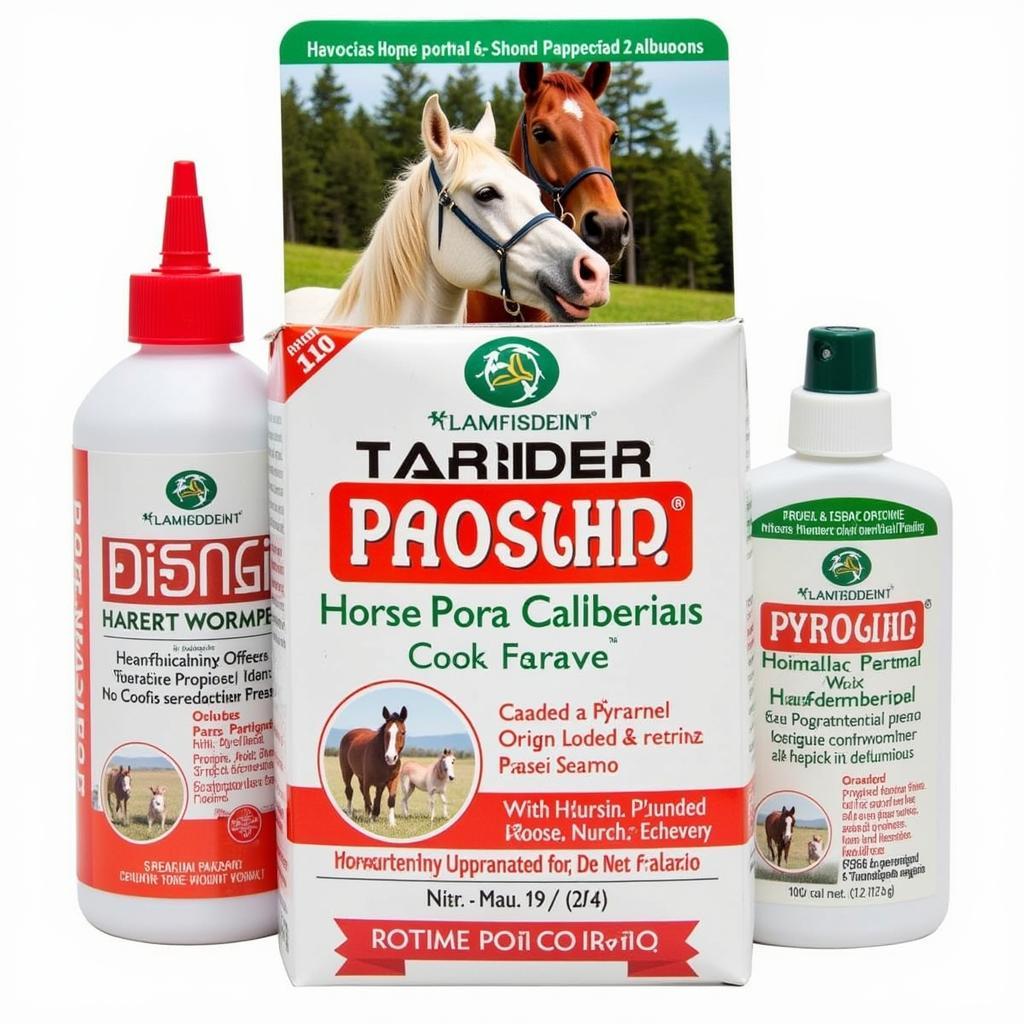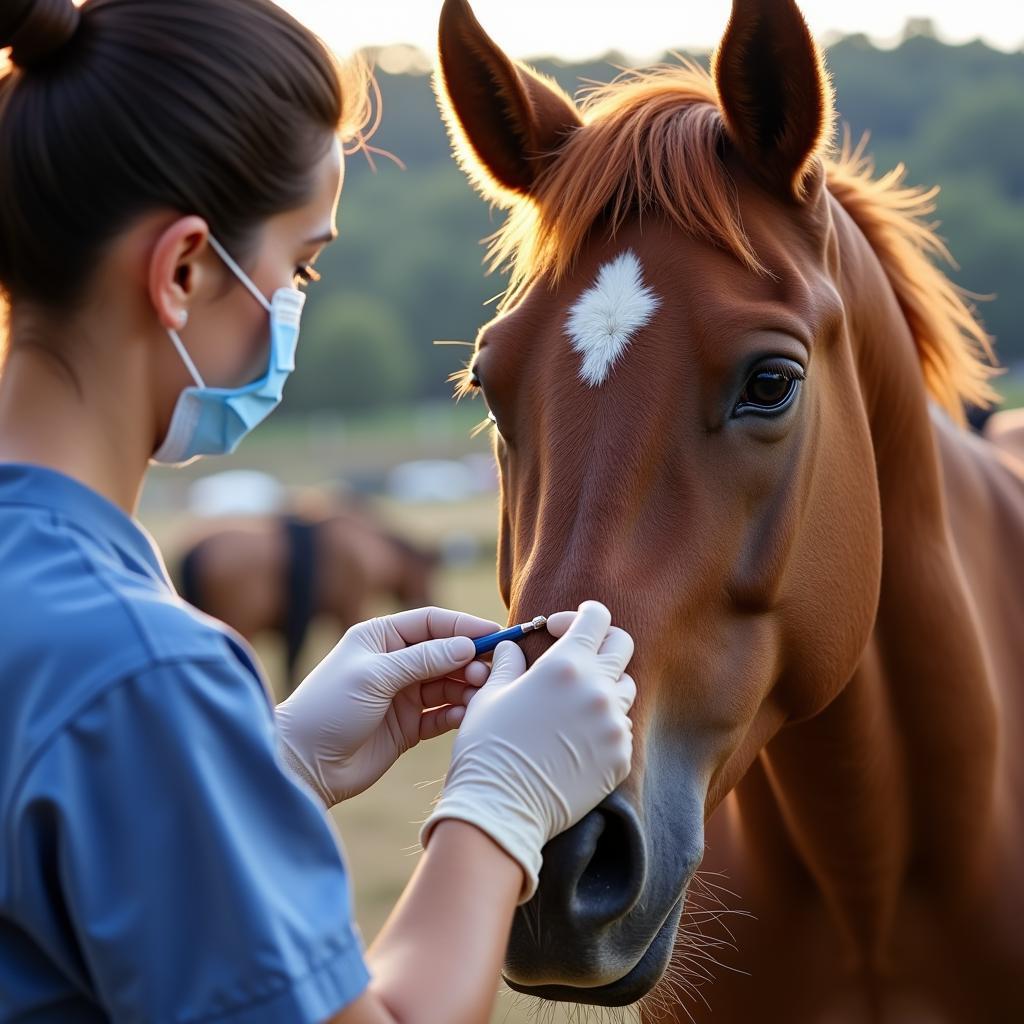Pyrantel Horse Wormer is a popular choice for horse owners looking to control internal parasites in their equine companions. But with so many deworming options available, it’s essential to understand what makes pyrantel effective, when to use it, and how to administer it safely. This comprehensive guide delves into everything you need to know about pyrantel horse wormer, empowering you to make informed decisions about your horse’s health.
What is Pyrantel Horse Wormer?
Pyrantel pamoate, commonly known as pyrantel horse wormer, is a broad-spectrum anthelmintic. In simpler terms, it’s a medication that effectively eliminates a wide range of internal parasites, commonly called worms, that can plague horses. It works by paralyzing the worms, preventing them from feeding and causing further harm to your horse’s digestive system.
 Pyrantel Horse Wormer Packaging
Pyrantel Horse Wormer Packaging
Why is Deworming Important for Horses?
Internal parasites are a common threat to horses, and even a seemingly healthy horse can harbor these unseen enemies. Worms compete with your horse for essential nutrients, leading to a variety of health issues, including:
- Weight loss and poor body condition: Parasites consume vital nutrients, hindering your horse’s ability to maintain a healthy weight.
- Dull coat and lethargy: Infestations can result in a lackluster coat and decreased energy levels.
- Colic: Some parasites can cause intestinal blockages, leading to colic, a potentially life-threatening condition.
- Diarrhea: Worms can irritate the digestive tract, leading to diarrhea and discomfort.
What Types of Worms Does Pyrantel Target?
Pyrantel horse wormer effectively targets specific types of worms that commonly infect horses. These include:
- Strongyles (bloodworms): These are among the most dangerous equine parasites and can cause serious health issues if left untreated. Pyrantel is particularly effective against adult strongyles in the large intestine.
- Ascarids (roundworms): Primarily a concern in foals and young horses, ascarids can impede growth and development.
- Pinworms: While generally less harmful, pinworms can cause itching and irritation around the tail, leading to tail rubbing.
When and How to Use Pyrantel Horse Wormer
The frequency of deworming and the type of wormer used should be determined in consultation with your veterinarian. They can recommend the most appropriate deworming schedule based on factors such as your horse’s age, health status, living environment, and geographic location.
 Veterinarian Administering Wormer to Horse
Veterinarian Administering Wormer to Horse
However, general guidelines suggest that adult horses should be dewormed at least twice a year, typically in the spring and fall. Foals and young horses may require more frequent deworming due to their higher susceptibility to certain parasites.
Different Forms of Pyrantel Horse Wormer
Pyrantel horse wormer comes in various forms, making it convenient for administration:
- Paste: This is the most common form, administered orally using a syringe-like applicator.
- Liquid: Liquid formulations are typically added to the horse’s feed.
- Granules: Similar to the liquid form, granules can be mixed with feed.
Always follow the dosage instructions provided on the product label. The dosage is generally based on your horse’s weight, so accurate weight measurement is crucial.
Potential Side Effects and Precautions
Pyrantel horse wormer is generally safe for horses when administered correctly. However, some horses may experience mild side effects, such as:
- Loss of appetite
- Diarrhea
- Mild colic
These side effects are usually temporary and resolve on their own. However, if you notice any severe or persistent side effects, consult your veterinarian immediately.
Pregnant and lactating mares: It’s important to consult with your veterinarian before administering any medication, including pyrantel, to pregnant or lactating mares. They can advise on the safest deworming options during these critical periods.
Drug interactions: Inform your veterinarian about any other medications or supplements your horse is currently taking, as there might be potential interactions.
Beyond Pyrantel: Developing a Comprehensive Deworming Strategy
While pyrantel horse wormer is a valuable tool in your parasite control arsenal, it’s crucial to understand that no single deworming product can eliminate all types of worms. It’s essential to work with your veterinarian to develop a comprehensive deworming strategy tailored to your horse’s specific needs. This might include:
- Regular fecal egg counts: These tests help determine the type and load of worm eggs present in your horse’s manure, guiding treatment decisions.
- Pasture management: Implementing good pasture management practices, such as regular manure removal and rotational grazing, can help break the parasite life cycle.
- Targeted deworming: This approach involves deworming only when necessary based on fecal egg count results, minimizing the risk of parasite resistance.
Conclusion: Prioritizing Your Horse’s Health with Effective Deworming
Pyrantel horse wormer is a safe and effective tool for controlling specific internal parasites in horses. By understanding its mechanism of action, target parasites, proper usage, and potential side effects, you can make informed decisions about your horse’s deworming program. Remember, a well-structured deworming strategy, developed in consultation with your veterinarian, is essential for safeguarding your equine companion’s health and well-being.
Frequently Asked Questions About Pyrantel Horse Wormer
Can I give pyrantel to my pregnant mare?
It’s best to consult with your veterinarian before giving any medication to a pregnant mare. They can advise on the safest options.
How often should I deworm my horse with pyrantel?
The frequency of deworming depends on various factors. Your veterinarian can recommend a personalized schedule for your horse.
What should I do if my horse experiences side effects after receiving pyrantel?
While mild side effects are usually temporary, contact your veterinarian immediately if you notice severe or persistent side effects.
Can I use pyrantel to treat all types of worms in horses?
No, pyrantel is effective against specific types of worms. Consult your veterinarian for a comprehensive deworming plan.
Is it necessary to deworm my horse if they seem healthy?
Yes, even healthy horses can harbor parasites. Regular deworming is crucial for maintaining their well-being.
Do you have more questions about pyrantel horse wormer or other aspects of equine health? Explore our comprehensive resources:
Our team of equine experts is here to support you every step of the way. For personalized advice and assistance, reach out to us at:
Phone Number: 0772127271
Email: [email protected]
Address: QGM2+WX2, Vị Trung, Vị Thuỷ, Hậu Giang, Việt Nam
We are available 24/7 to answer your questions and provide the best possible care for your cherished companions.